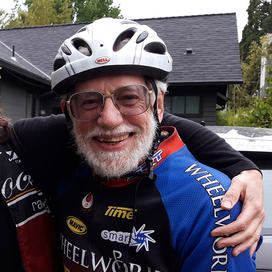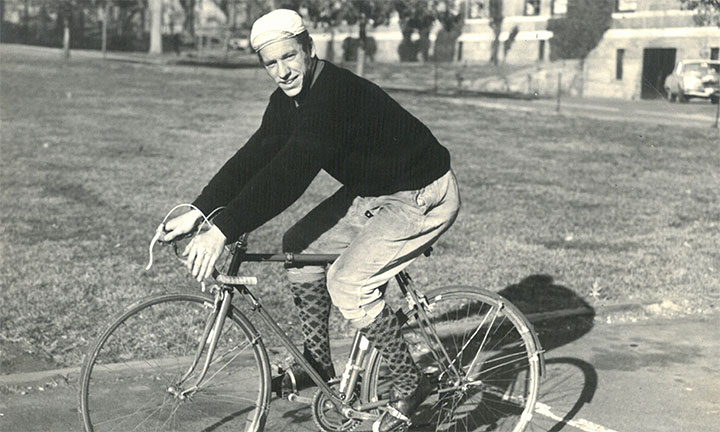Olympian John Allis ’65 Revisits His Roots as a Bike Racer

Allis can stand next to two seemingly identical frames and point out the difference of fork degrees or pipe angles. At age 77, his life is still tied to his bikes. Every day he rides, and if he goes longer than his daily one-mile route to pick up the paper at the general store, he’ll ride by time and not distance, because as a racer, Allis has devoted his life to measuring accomplishments by time.
In 1964, Allis competed in his first Olympics as a senior at Princeton. When he first arrived at Princeton, becoming an elite athlete was not in his plans. His life changed in a Princeton bike shop, where he met a sophomore named Leif Thorne-Thomsen ’63. “Leif wanted to go for a ride,” Allis says. “We got along, and after about an hour he committed me to starting the Princeton bike team.”
After a few years of competing on the collegiate circuit, Allis decided to enter the bicycle racing trials for the 1964 Olympics taking place in New York’s Central Park. Of all the qualifying events, the one he remembers best was the 100-mile circuit: 20 loops around the same course, fighting for position among hundreds of other racers.
When he returned to Princeton for his final year after qualifying for the most prestigious athletic event in the world, Allis’ Olympic dream was almost derailed by one small issue: He was on academic probation. When he met with the dean to get his blessing to leave campus, Allis says, the dean delivered a firm, “Absolutely not!” But after the dean conferred with other faculty and secured a promise from Allis that he would take his books with him, Allis departed for Tokyo.
Allis remembers the peaceful Olympic cycling village in Hachioji, the blue-suited schoolchildren who waited outside the village for autographs, and the cultural center where he attended tea ceremonies. “To be exposed to their culture in that way was marvelous because it was very personal," he says.
Competitively, Allis lacked the experience of his Olympic peers. He has never forgotten the challenge of racing up steep inclines built specifically for the race, banked with concrete gutters. He started towards the rear of the crowd and by the time he reached the hill, there was a mass of cyclists bunched together. Some racers fell into the gutters. It was chaos. “The whole thing was a bit of a disappointment but also a spectacle,” he says.
The ’64 Olympics would not be Allis’ last. He competed twice more, in Mexico and West Germany, and both events were marred by tragedy: the Tlatelolco Massacre, a deadly government crackdown on protesters in Mexico City; and the murder of Israeli athletes by terrorists in Munich.
Now years later, Allis will return to the scene of his favorite Olympic memory, when he experienced Japan’s beauty during his weeks at the cycling village. In October, he will leave his New Hampshire village to once again pedal the trails where his Olympic career began. For a man who spent years racing the clock, it is a rare opportunity to pedal back in time.












No responses yet